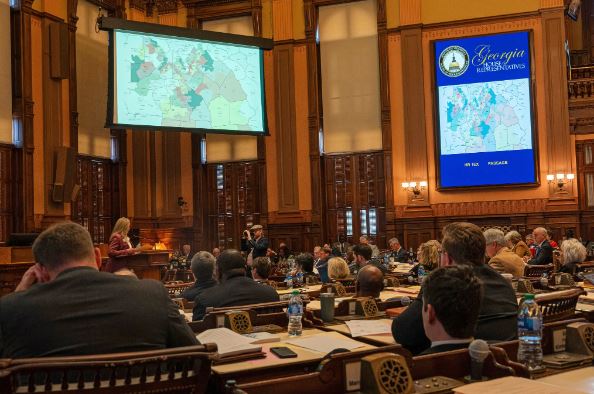In a recent development, a federal judge has ruled that the Georgia legislature has met the requirements to draw voting maps, allowing equal opportunities for Black voters to elect representatives of their choice. The Republican-led legislature faced criticism for redrawing state and congressional maps during a December special session. The initial districts, created after the 2020 census, were deemed in violation of the 1965 Voting Rights Act by a federal judge in Atlanta. The updated maps include an additional majority Black congressional district but have sparked objections from Democrats and Black voters in the state. However, Judge Steve C. Jones of the Northern District of Georgia has now approved the new maps, suggesting compliance with the Voting Rights Act. Despite concerns over fair representation, the approved maps are expected to maintain the 9-5 majority held by Republicans in Georgia’s congressional delegation.
The controversy surrounding Georgia’s redistricting had additional political implications. With the House of Representatives finely balanced and Black voters historically supporting Democrats in the state, redistricting decisions had the potential to impact the power dynamics in Washington. The legal challenges were brought by various plaintiffs, including the African Methodist Episcopal Church and members of Alpha Phi Alpha Fraternity. While the challenges aimed to address existing inequities, the court ruled in favor of the legislature’s efforts. Similar redistricting challenges are ongoing in several Southern states, including Alabama, where a Supreme Court ruling affirmed the core tenet of the Voting Rights Act.
The plaintiffs in Georgia argued that the new maps, despite creating additional majority-Black districts, were unfavorable to Representative Lucy McBath, a Democratic congresswoman. The maps also protected Republican incumbents in both the Statehouse and Washington from potential primary challengers. Despite objections, Judge Jones acknowledged the legislature’s compliance with the court’s order to create a majority-Black congressional district in the region where vote dilution was identified. The judge’s ruling rejected challenges to the redrawn congressional and state legislature maps.
The redistricting dispute unfolded as Democrats made significant gains in Georgia, chipping away at Republican dominance over multiple election cycles. The growth of Black voters in the state since 2000 played a role in diminishing Republican influence. In 2020, Georgia elected a Democratic president for the first time since 1992, followed by the election of two Democratic senators in 2021. Republican efforts to curb this influence were evident during the special session in December, where new maps were drawn to potentially maintain Republican control in both congressional and state legislative chambers.
While the updated maps created additional majority-Black districts, they also strategically impacted Representative Lucy McBath, a Black Democrat representing parts of Fulton and Gwinnett Counties. The plaintiffs argued that the redrawing of Ms. McBath’s district deprived a coalition of voters of color of the opportunity to elect a representative of their choice. However, Judge Jones focused on Black voters in the current case and declined to expand the scope beyond that group. This decision marks the second time Republicans have targeted Representative McBath, who announced plans to run in a different district under the new maps, emphasizing the significance of the upcoming election.
In conclusion, the approval of Georgia’s redrawn voting maps by a federal judge has sparked debates over fair representation and political maneuvering. Despite objections from Democrats and Black voters, the court has determined that the legislature complied with the Voting Rights Act. The decision is likely to impact the balance of power in Washington, highlighting the ongoing challenges and controversies surrounding redistricting processes in Southern states.

